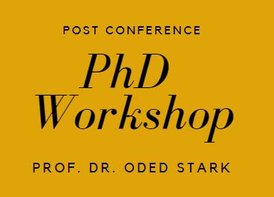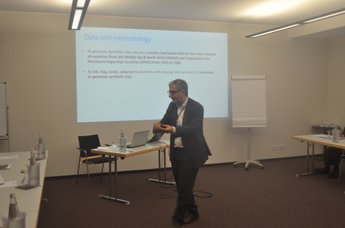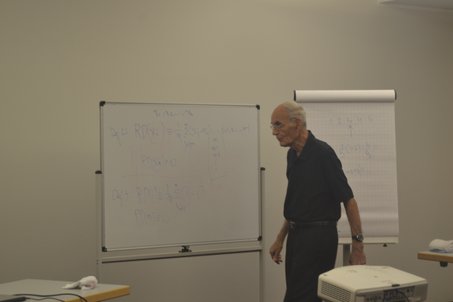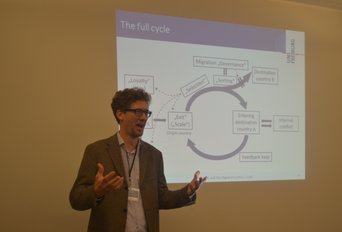2019 GEC CONFERENCE
10-11 October 2019
Kassel, Germany
Submissions are closed
Early-bird registration deadline
05 June 2019
For inquiries contact us at events@ms-researchhub.com
2019 GEC Conference Highlights
The 2019 GEC Conference started with an introductory session by Dr. Hassan from M&S Research Hub to greet the attendees and the guest speakers while highlighting some logistics related to the conference. The theme of this year’s conference” People displacement” is an alarming global topic. The UNHCR latest reports postulate that the level of people displacement –both internally and externally- has reached the highest levels in modern history. An unprecedented 70.8 million people around the world have been forced from home. Among them are nearly 25.9 million refugees, over half of whom are under the age of 18.
Around 6.7 million refugees came alone from Syria, followed by 2.7 M from Afghanistan and then 2.3 M from South Sudan. The top refugees hosting countries –surprisingly- contain only one developed country Germany, and the rest are developing countries. These dynamics have triggered various economic, social, political and environmental effects on the displaced people, destination and host countries.
The introductory session was followed by Prof. Farzanegan's talk about “Growing up in the Iran-Iraq war and preferences for strong defense”. Given the Iranian roots of Prof. Farzanegan it was quite interesting to hear about such topics from a native person who actually lived the incidences of the Iranian revolution and Iraq-Iran war. The theme of the lecture was to discuss mainly how Iran could look like if no revolution has never occurred. This lecture is based on one of the current research by Prof. Farzaenagn that discusses the same point while applying Synthetic control method to build a counterfactual Iran based on data from countries that have a relatively similar economic and social structure like Iran before revolution.
The talk has also discussed a second interesting research point about the preferences of Iranian people who have witnessed the two incidences- revolution and war- to support a larger military budget relative to other Iranians who were not born at these times or were children. The results showed strong evidence in favor of this hypothesis and postulated that actually those who were interviewed during the last five years and were aged 18-25 during these incidences are strong supporters for larger budgetary shares for military and defense spending.
The second plenary lecture “A theory of migration as rank-seeking behavior” was delivered by the esteemed Prof. Oded Stark, it was unconventional lecture on a whiteboard and using a marker where Prof. Stark with his outstanding record of publications and immense experience started a highly intuitive mental journey with the attendees towards a better understanding of the inner motives of the migration decision.
He has written complete theories and their mathematical proofs on the board showing that the personal migration decision is a sustained attempt by individuals to improve their societal ranking even if they ended up having lower absolute income in the destination country. He has shown us different scenarios about different ranking positions and how eventually those people who have a lower relative ranking decide to leave their original regions and migrate to other regions.
On the second day, Prof. Tim Krieger has presented an overview of different theories and arguments about the migration-conflict dynamics in his talk “Institutions and the migration-conflict cycle”. He presented several dynamic diagrams showing the cycles of the push-pull factors of migration. Prof. Krieger has discussed the idea of sorting that defines, which people actually decide to migrate outside a country after a conflict and which people chose to stay. On the other hand the selection phase which defines which migrants are reallocated to which destination country and the reasons for this selection.
At the afternoon session of the second day, Prof. Oded Stark moderated a workshop that extended for around two hours about the internal motives of the migration decision. Again using the whiteboard, marker and his memory, mathematical proofs of complete theories were discussed showing that the “Relative Deprivation” is one or maybe the strongest push factor for the migration decision making. In connection to rank improvement seeking behavior, people could actually choose to migrate to another community where they feel relatively less deprived and to be in a better ranking even if this decision ends with the cost of having lower absolute income. Reflections of these theories have shed light on a surprising phenomenon that is usually observed by migrants in their new destination countries that they always have a tendency to oppose the nationalization and integration policies of learning the destination countries' language and cultural norms. This opposition emits from the fact that the migrants prefer to surround themselves with the communities of similar migrants who have similar income levels for the sake of feeling relatively better because when they become integrated into the destination country natives they will start comparing themselves to another richer circle and thus they can feel more deprived.









